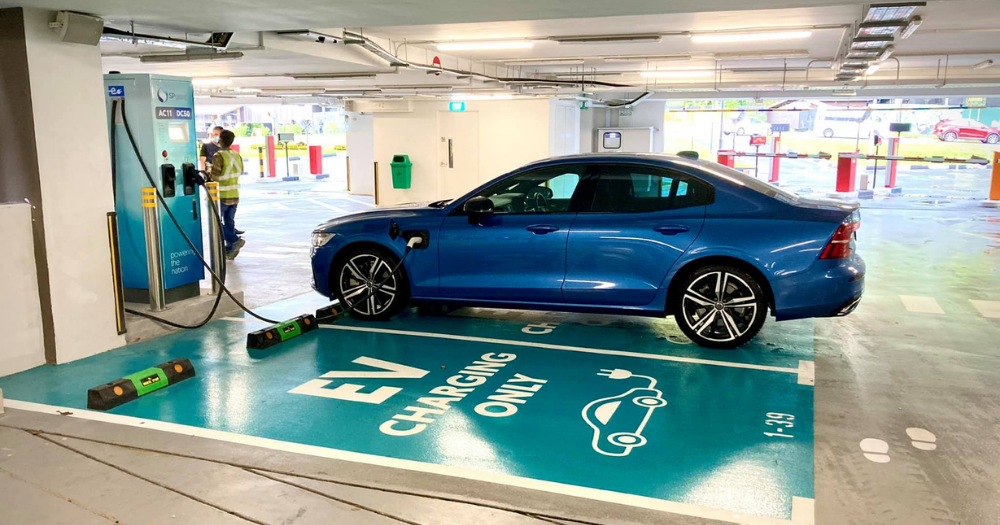In line with the country's move towards sustainability and renewable energy, the government has announced measures to increase the adoption rate of environmentally-friendly electric vehicles (EVs).
This includes a national EV charging network, where 60,000 EV charging points will be deployed across Singapore by 2030.
40,000 charging points will be deployed in public car parks, while the remaining 20,000 will be at private premises.
This is an increase from the original target, which was to provide 28,000 charging points by 2030.
EV-ready towns
The government is aiming to have at least eight “EV-Ready Towns” by 2025.
By 2025, all HDB car parks in these eight towns across Singapore will be fitted with EV charging points, Minister for Transport Ong Ye Kung revealed on Mar. 4 during his Committee of Supply debate for the Singapore Green Plan.
These EV-ready towns are Ang Mo Kio, Bedok, Choa Chu Kang, Jurong West, Punggol, Queenstown, Sembawang and Tengah.
These specific towns were selected as they are well spread out across the island, and have a high concentration of car parks with existing electrical capacity to support the deployment of charging points.
With 60,000 EV charging points in Singapore by 2030, and assuming that one-third of cars are electric by then, Ong said this would make the ratio of electric cars to chargers 5:1.
This is on the higher end of many public estimates of the optimal ratio, which ranges from 5:1 to 10:1.
Slow charging
Most of these charging points will be slow chargers.
Ong emphasised that the key is "to not insist" on high-powered fast chargers, as this would require a major upgrade to almost all existing power substations and grid infrastructure in Singapore.
"It would be costly, time-consuming, stall the development and expansion of charging infrastructure, and severely impede the adoption of EVs," he said.
Hence, using slow chargers would require a mindset shift as drivers are used to quick visits to the petrol station, Ong added.
"We are used to patiently charging all our electronic devices whether they are smart phones, smart watches or laptops, while we sleep, or while we are in office doing work. It will be the same for EVs."
As an average electric car with a range of around 400km to 500km requires a full charge once every five days, users will need to share charging points, especially those in public car parks.
In the near term, charging points will be installed in various car parks around Singapore where there is spare electrical capacity, bearing in mind the government's aim to make all towns EV-ready by the 2030s.
Previously, a pilot tender by the Urban Redevelopment Authority and LTA for charging points was issued in Nov. 2020, covering over 600 charging points at over 200 public car parks.
Chargers at condos too
Those living in private properties will get access to charging points as well.
For existing non-landed private residences, the Land Transport Authority (LTA) will be introducing a grant, part of the S$30 million allocated in the Budget, to kickstart the expansion of shared charging infrastructure in these premises.
With the EV Common Charger Grant, 2,000 chargers will be installed in non-landed private premises between July 2021 and Dec. 2023.
More details about this will be revealed by LTA in the second quarter of this year.
Moving forward, the government will ensure that new building developments have the sufficient electrical capacity to support wider EV adoption.
All new HDB carparks will have sufficient electrical capacity to support EV slow charging for 15 per cent of their carpark lots, and a minimum number of chargers will be installed at these lots.
Additionally, this requirement will be imposed on new private buildings, as well as existing buildings undergoing major redevelopment.
All these measures to encourage EV adoption will be led by a new National Electric Vehicle Centre (NEVC), set up under LTA.
In line with Singapore's vision to use cleaner energy by 2040, the NEVC will also lead efforts to review EV regulations and standards and facilitate the development of EV-related technologies.
Top photo from Jefferson Tan / FB
If you like what you read, follow us on Facebook, Instagram, Twitter and Telegram to get the latest updates.
